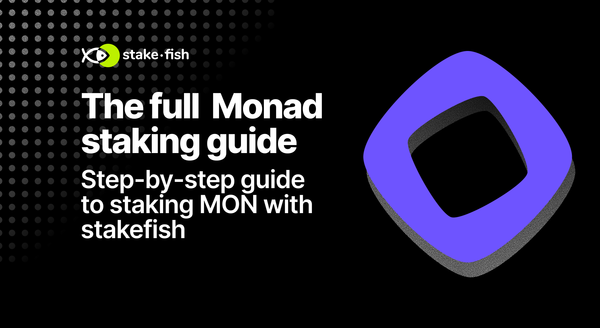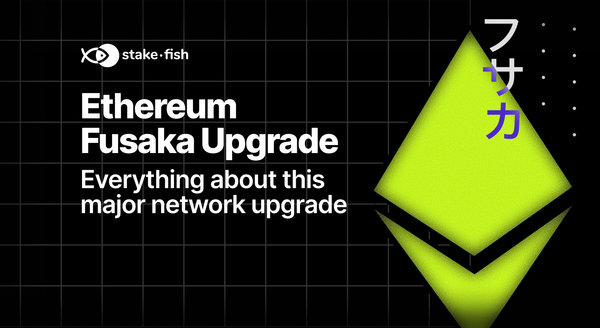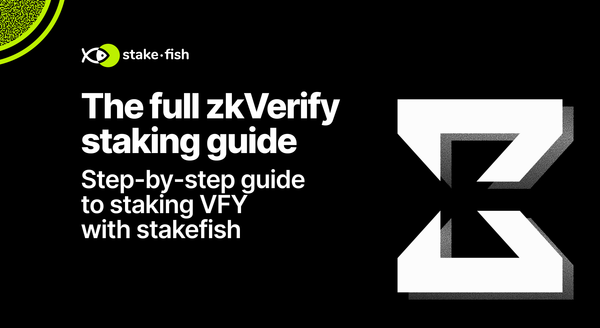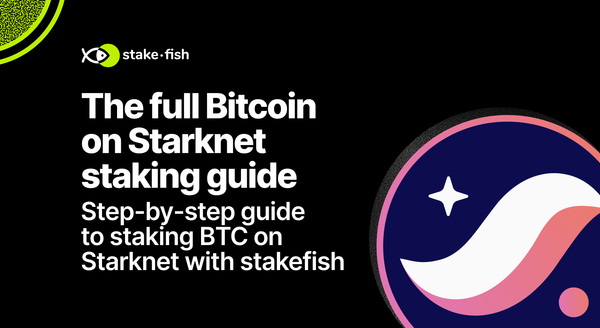Introducing stakefish Ethereum staking 2.0
We are happy to unveil a new version of our non-custodial Ethereum staking service. This new version enables anyone to stake as little as…

We are happy to unveil a new version of our non-custodial Ethereum staking service. This new version enables anyone to stake as little as 0.1 ETH with stakefish. You can try our beta release on Goerli test network here starting today. The mainnet release will be available in early December. We’ll make a follow-up announcement at that time.
Pursuing Our Core Values
It has been a year since we first announced our stakefish validators for the Beacon Chain, Ethereum’s consensus layer. Since then, the network has more than proven itself and its readiness to run the world’s more active blockchain. We thank the Ethereum Foundation’s researchers and the consensus layer client teams for their tireless efforts on carrying the network to its current state.
We are grateful for the amount of interest our community has shown us since launch as well. We have seen early growth and interest in our Ethereum validators. We feel lucky to have community members who truly recognize our values and philosophy.
Now it’s time for us to unveil another step in our mission to lower the barriers to staking. Accessing stakefish validators required a considerable stake of 32 ETH. That changes now. Today, we’re excited to announce we’ll be launching a staking service that enables users to contribute to the security of Ethereum and earn staking rewards with stakefish validators with only 0.1 ETH.
How does it work?
The staking period is predefined, so you’ll need to set a reminder for yourself on when the staking period ends. When you stake Ethereum, you are sending your ETH to a separate smart contract that gathers the 32 ETH necessary to collectively stake a validator. Then afterwards, the 32 ETH is sent to the official Ethereum Deposit Contract and is paired with one of our validators. Our validators currently use Lighthouse and Prysm clients (with Nimbus and Teku on the way). At the end of the staking period, the staked Ethereum will be automatically withdrawn back to the smart contract and distributed back to you. We never hold custody of your staked Ethereum at any time.
The smart contract we use has been audited twice by Solidified and Runtime Verification. A new smart contract is deployed each time a stake of 32 ETH is met.
What are the risks?
We want you to make the most informed decision when it comes to staking. Therefore, here are the risks you should be mindful of:
- Staking requires the use of a smart contract to meet the 32 ETH threshold for a validator. Each contract deployment represents a single validator. This contract source code has been audited twice by Solidified and Runtime Verification. While there are no known vulnerabilities, as all things go, there could be unforeseen bugs in these smart contracts.
- We will be running the validators for all of the Ethereum staked via our service. While we are fully incentivized and aligned to keep running a highly performant infrastructure, this could be considered a single source of failure. If this is one of your concerns, we recommend checking out staking solutions with multiple operators.
- There could be network wide issues. The consensus layer has been running without large hiccups so far, but that does not mean there won’t be any critical vulnerabilities discovered in the future.
- Withdrawal may be delayed for a long time. There is a cap on how many validators can exit for each time interval. It may take a long time for funds to be exited from Ethereum’s consensus layer and returned to Ethereum’s execution layer’s smart contracts and ultimately, your wallet.
Of course, slashing will be a risk to keep in mind. We have never had any slashing through our history, but this is a real risk that has occurred on the network.
How does it compare to other services?

It’s no secret that there are many platforms today where users can stake any amount of ETH. Lido is a well known solution today when it comes to liquid staking with others like Rocketpool, Stakewise, and StaFi. We are genesis supporters of Lido and will continue to do so into the far future. If you are looking to engage with DeFi on your staked Ethereum, solutions like Lido may be more suited for you.
Staking with us will mean you will have dedicated access to our validators. We pride ourselves in our validator operations, and understand that stakers would like to choose a longstanding validator like us. Staking with us will mean you conduct vanilla staking. We don’t issue staking any tokens. You can stake with us knowing you will earn staking rewards until the exit date without any complexity.
What’s next?
We’ll be keeping a close eye on the upcoming Merge. This is going to be the biggest upgrade to Ethereum of all time and we’ll make sure to be ready for it. The other high priority item for our Ethereum validators is to add Nimbus and Teku to the list of clients we support. A multi-client future is a necessity for the security and health of Ethereum, and we’ll make sure to do our part by further diversifying our stack. So, stay tuned on this!
If you haven’t done so, we invite you to do a dry run of our beta version on Goerli test network by clicking here and to share your feedback with us through any of our channels; including email: eth2+beta@stake.fish, Twitter and Telegram. We very much value the engagement with our community and your participation will help us provide the best possible service to you.
From your friendly neighborhood validator, stakefish!
About stakefish
stakefish is the leading validator for Proof of Stake blockchains. With support for 10+ networks, our mission is to secure and contribute to this exciting new ecosystem while enabling our users to stake with confidence. Because our nodes and our team are globally distributed, we are able to maintain 24-hour coverage.
Website: https://stake.fish
Telegram: https://t.me/stakefish
Twitter: https://twitter.com/stakefish
Instagram: https://www.instagram.com/stakedotfish





